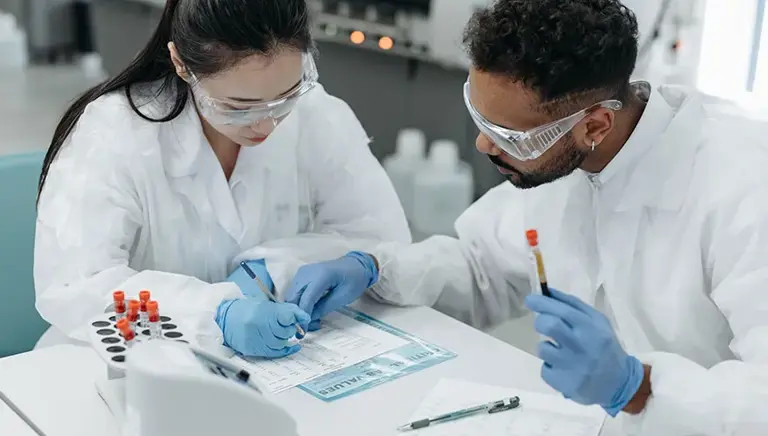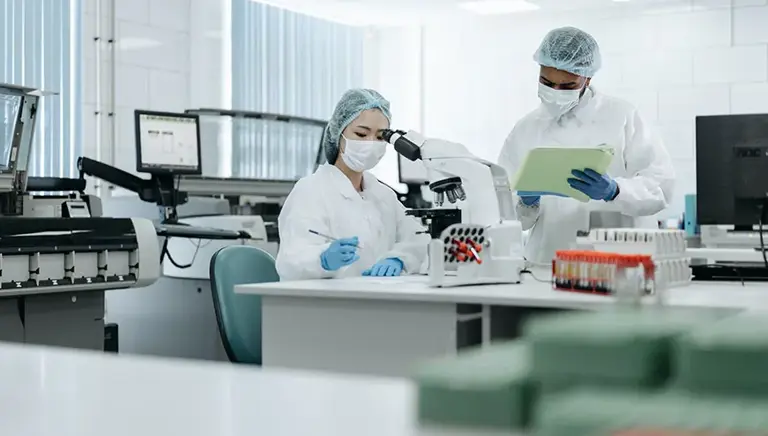Act now to bring £68bn economic boost to the UK through new research investment
The UK life science sector faces a “moment of truth” according to a new report produced by PwC for the Association of the British Pharmaceutical Industry. While it has the infrastructure, science base and skills to retain - and build - its position as a world-leading hub for medicines development and discovery, Government must act swiftly to fend off competition from countries like France and Germany who have become more adept at attracting investment.
While there are some good individual examples of investment, the overall picture in the UK shows that manufacturing, clinical research and exports are all in decline, whilst competitor countries have strengthened their life science bases.
One year on from the launch of the UK Government’s Life Science Vision, the report quantifies the size of the prize if the Vision is implemented in full and the UK can emulate the successes of leading EU countries. These include:
- £68 billion in additional GDP over 30 years, owing to increased R&D investment
- £16.3 billion additional annual GDP from increased pharmaceutical exports
- Supporting 85,000 additional jobs
- Up to 40 per cent decrease in disease burden across the whole UK – for areas like cardiovascular disease, mental health conditions and Cancer.
- Reduced variation in speed of access to new medicines within three months of licensing for all NHS patients.
The report maps the UK’s performance on 13 key performance indicators (KPIs) across R&D, manufacturing, and access and uptake of new medicines. The chart shows how the UK compares to similar nations, including Belgium, France, Germany, Italy, and the United States. These countries are all in the race to become the leading global hub for life sciences. (See notes to editors).
The evidence shows areas which need to be urgently addressed:
Clinical research
- Phase I clinical trials – early development of new medicines and treatments – initiated in the UK have dropped by 14 per cent per year from 2015 to 2019.
- Phase II and III clinical trials – which test the efficacy of new medicines and treatments relative to standard of care – initiated in the UK have dropped by 3% and 2% respectively from 2015 to 2019. The pandemic has exacerbated this downward trend, with the number of Phase II and Phase III trials falling by 18 and 22 per cent respectively in 2020.
- This has impacted on innovation in the sector: The UK’s number of global clinical trial firsts falling year on year, from 24 in 2017/18 to 15 in 2018/19 and 14 in 2020/21 to 8 in 2020/21
Pharmaceutical industry spend on research and development
The UK’s share of global pharmaceutical R&D has been declining over the past decade, falling from 7.7 per cent in 2012 to 4.2 per cent in 2020.
- UK R&D spending could have been £3.2bn higher per year for the last 8 years, had we kept pace with global trends
Manufacturing
While Government has introduced policies to enhance UK medicines manufacturing, the Life Science Vision recognises more needs to be done to keep up with global competition. Despite a large manufacturing base, with 2,000 manufacturing plants , since 2009 production volumes fell by 29 per cent and over 7,000 jobs lost.
And, while other countries have expanded production and exports, since 2015 the UK’s pharmaceutical exports have fallen by six per cent between 2015 and 2019 and a further nine per cent reduction from 2019 to 220. In Germany, France, Italy, Ireland, Switzerland, Belgium, the Netherlands, and US they have all surged.
Access and uptake
The UK is also seen as one of the most challenging markets for access and uptake of new medicines in the EU, impacting on the location of global investment decisions.
Implementing the Life Science Vision and the gains to be made
The authors say there is no single reason the UK should be seeing this decline, but the life science eco-system must be firing on all cylinders for it to be effective.
The report finds that the ambition of the Life Sciences Vision – to build the world’s leading medicines and vaccines hub – is feasible. However, there is some way to go.
Four key areas of the Vision are highlighted: Creating the right business environment; research infrastructure; innovation access and uptake; and healthcare challenges of the future.
If the UK could emulate the success of similar nations, gains could be substantial:
- Creating the right business environment: By increasing the UK’s percentage of global pharmaceutical exports from 4.3% to 8.3%, in line with Belgium or Ireland would bring £16.3 billion in GDP and create 85,000 new jobs.
To do this the UK would need to increase its share by 4 percentage points - less than the 5.85 percentage point expansion achieved by Germany between 2002 and 2008.
- Tackling future healthcare challenges: by raising its performance in tackling the priority challenges set out in the Vision, the UK could cut the overall health burden by 40%.
By emulating countries including Singapore, Norway and Switzerland across disease areas including dementia Cancers, cardiovascular disease and respiratory disease alone, we could reduce the UK’s 6.5 million DALYs - Disability-adjusted life years, which measure disease years lost due to ill-health, disability, or early death - to 2.6 million DALYs.
- Supporting access and uptake environment: Reducing variation in how quickly medicines are available on the NHS so that all are available within three months of licensing. This would be in line with NICE’s ambition, and rival leading countries like Germany and Denmark. For patients with conditions like cancer or rare diseases, this could be lifesaving. For the Vision to be a success, increasing adoption at scale will drive up the UK’s performance compared to other countries, where presently we underperform.
- Building on the UK’s science and clinical research infrastructure: By raising pharmaceutical R&D investment in the UK to a per-capita level comparable with that of the US, an extra £7.2 billion investment would be channelled to the sector each year.
- Additionally, improving the UK’s share of global commercial clinical trial enrolment to levels consistent with leading countries, like Spain, the analysis shows that around £165 million in additional revenues and the NHS could see £32 million in additional savings each year.
Richard Torbett, Chief Executive of the Association of the British Pharmaceutical Industry, said:
"The report shows the opportunities that investment in life sciences can bring to UK patients, the NHS and the economy.
"Global competition is fiercer than ever, and the UK is struggling to keep pace with competitors like France and Germany. By prioritising this sector, building strong research and manufacturing bases and creating policies to improve access to medicines for patients we can be a world leader in ten years. We know Government shares this ambition and we urge them to work with us to fulfil the UK’s potential."
- Economy and Industry
- Pricing
Last modified: 20 September 2023
Last reviewed: 20 September 2023
-
ABPI Life Sciences Superpower Report
Download

